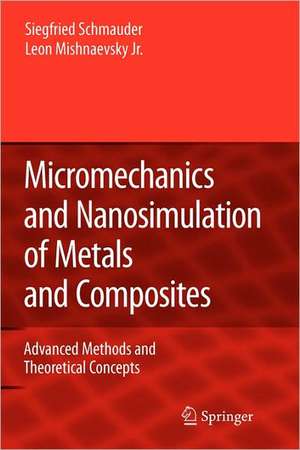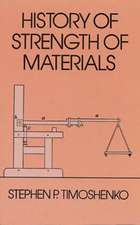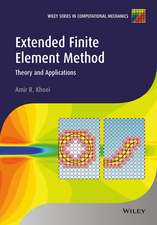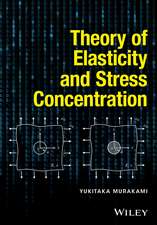Micromechanics and Nanosimulation of Metals and Composites: Advanced Methods and Theoretical Concepts
Autor Siegfried Schmauder, Leon Mishnaevskyen Limba Engleză Paperback – 18 oct 2010
| Toate formatele și edițiile | Preț | Express |
|---|---|---|
| Paperback (1) | 951.14 lei 6-8 săpt. | |
| Springer Berlin, Heidelberg – 18 oct 2010 | 951.14 lei 6-8 săpt. | |
| Hardback (1) | 958.38 lei 6-8 săpt. | |
| Springer Berlin, Heidelberg – 27 oct 2008 | 958.38 lei 6-8 săpt. |
Preț: 951.14 lei
Preț vechi: 1159.94 lei
-18% Nou
Puncte Express: 1427
Preț estimativ în valută:
181.100€ • 190.53$ • 150.59£
181.100€ • 190.53$ • 150.59£
Carte tipărită la comandă
Livrare economică 05-19 aprilie
Preluare comenzi: 021 569.72.76
Specificații
ISBN-13: 9783642097454
ISBN-10: 3642097456
Pagini: 436
Ilustrații: XV, 420 p.
Dimensiuni: 155 x 235 x 23 mm
Greutate: 0.61 kg
Ediția:2009
Editura: Springer Berlin, Heidelberg
Colecția Springer
Locul publicării:Berlin, Heidelberg, Germany
ISBN-10: 3642097456
Pagini: 436
Ilustrații: XV, 420 p.
Dimensiuni: 155 x 235 x 23 mm
Greutate: 0.61 kg
Ediția:2009
Editura: Springer Berlin, Heidelberg
Colecția Springer
Locul publicării:Berlin, Heidelberg, Germany
Public țintă
ResearchDescriere
The strength of metallic materials determines the usability and reliability of all the machines, tools and equipment around us. Yet, the question about which mechanisms control the strength and damage resistance of materials and how they can be optimised remains largely unanswered. How do real, heterogeneous ma- rials deform and fail? Why can a small modification of the microstructure increase the strength and damage resistance of materials manifold? How can the strength of heterogeneous materials be predicted? The purpose of this book is to present different experimental and computational analysis methods of micromechanics of damage and strength of materials and to demonstrate their applications to various micromechanical problems. This book summarizes at a glance some of the publications of the Computational Mechanics Group at the IMWF/MPA Stuttgart, dealing with atomistic, micro- and meso- chanical modelling and experimental analysis of strength and damage of metallic materials. In chapter 1, the micromechanisms of damage and fracture in different groups of materials are investigated experimentally, using direct observations and inverse analysis. The interaction of microstructural elements with the evolving damage is studied in these experiments. Chapter 2 presents different approaches to the - cromechanical simulation of composite materials: embedded unit cells, multiphase finite elements and multiparticle unit cells. Examples of the application of these models to the analysis of deformation and damage in different materials are given. Chapter 3 deals with the methods of numerical modelling of damage evolution and crack growth in heterogeneous materials.
Cuprins
Micromechanical Experiments.- Micromechanical Simulation of Composites.- Simulation of Damage and Fracture.- Complex, Graded and Interpenetrating Microstructures.- Atomistic and Dislocation Modelling.
Notă biografică
Siegfried Schmauder
Professor Dr. Siegfried Schmauder is currently a Professor of Materials Science and Strength of Materials, at the University of Stuttgart, Germany. He graduated in Mathematics from the University of Stuttgart in 1981, and received his Dr. rer. nat. degree from the same University in 1988. After his work as a research group leader at the Max-Planck-Insitute for Metals Research and postdoctoral research stays at the .Tokyo and at the University of California at Santa Barbara (UCSB), USA, he accepted an offer to become a Professor at the State Materials testing Agency (MPA), University of Stuttgart. He is an Editor-in-Chief of the Journal Computational Materials Science, and author of more than 300 research papers in the field of nano- and micromechanics.
Leon Mishnaevsky Jr.
Leon Mishnaevsky Jr. is a Senior Scientist at the Risø National Laboratory, Denmark. Prior to joining Risø, he worked as a research scientist and later as a Heisenberg Fellow at the University of Stuttgart, and at the Darmstadt University of Technology. LM received his Dr. -Ing. Habil. degree in Mechanics from the Darmstadt University of Technology, Germany, and his doctorate from the USSR Academy of Sciences. He has held visiting professor/visiting scholar positions at M.I.T. and Rutgers (USA), University of Tokyo (Japan), China University of Mining and Technology (China) and Ecole Nationale Superieure d'Arts et Metiers (France). He published books on "Computational mesomechanics of composites" and "Damage and fracture in heterogeneous materials", and over 100 research papers in different areas of computational mechanics of materials, micromechanics and mechanical engineering.
Professor Dr. Siegfried Schmauder is currently a Professor of Materials Science and Strength of Materials, at the University of Stuttgart, Germany. He graduated in Mathematics from the University of Stuttgart in 1981, and received his Dr. rer. nat. degree from the same University in 1988. After his work as a research group leader at the Max-Planck-Insitute for Metals Research and postdoctoral research stays at the .Tokyo and at the University of California at Santa Barbara (UCSB), USA, he accepted an offer to become a Professor at the State Materials testing Agency (MPA), University of Stuttgart. He is an Editor-in-Chief of the Journal Computational Materials Science, and author of more than 300 research papers in the field of nano- and micromechanics.
Leon Mishnaevsky Jr.
Leon Mishnaevsky Jr. is a Senior Scientist at the Risø National Laboratory, Denmark. Prior to joining Risø, he worked as a research scientist and later as a Heisenberg Fellow at the University of Stuttgart, and at the Darmstadt University of Technology. LM received his Dr. -Ing. Habil. degree in Mechanics from the Darmstadt University of Technology, Germany, and his doctorate from the USSR Academy of Sciences. He has held visiting professor/visiting scholar positions at M.I.T. and Rutgers (USA), University of Tokyo (Japan), China University of Mining and Technology (China) and Ecole Nationale Superieure d'Arts et Metiers (France). He published books on "Computational mesomechanics of composites" and "Damage and fracture in heterogeneous materials", and over 100 research papers in different areas of computational mechanics of materials, micromechanics and mechanical engineering.
Textul de pe ultima copertă
This book provides insight into advanced numerical and experimental investigations of the microstructural aspects of strength and damage of metals and metal-based composites.
In particular, atomistic and dislocation models, micromechanical simulations and homogenization techniques, as well as experimental observations in combination with computer simulations, are described. These methods are successfully applied to analyze the mechanical behavior of metals and metal-matrix composites. Examples of the applications of the described methods include the investigation of microstructure/failure-resistance relationships of tool steels, damage in aluminum-based cast alloys as well as deformation, strength and fracture of hard metals.
The book addresses scientists, graduate and postgraduate students, as well as engineers, in the fields of materials science and engineering.
In particular, atomistic and dislocation models, micromechanical simulations and homogenization techniques, as well as experimental observations in combination with computer simulations, are described. These methods are successfully applied to analyze the mechanical behavior of metals and metal-matrix composites. Examples of the applications of the described methods include the investigation of microstructure/failure-resistance relationships of tool steels, damage in aluminum-based cast alloys as well as deformation, strength and fracture of hard metals.
The book addresses scientists, graduate and postgraduate students, as well as engineers, in the fields of materials science and engineering.
Caracteristici
Includes supplementary material: sn.pub/extras








